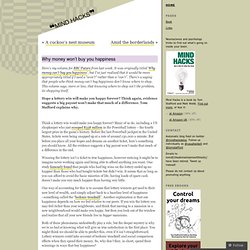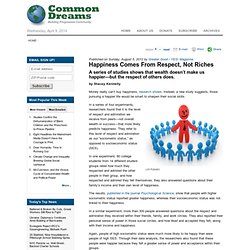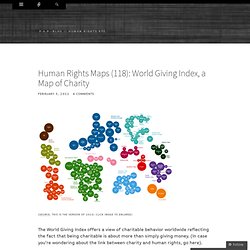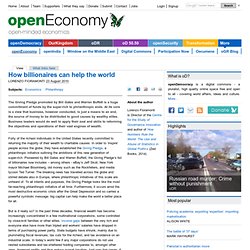

StartSomeGood: crowdfunding for non-profits, social entrepreneurs and changemakers. Why money won’t buy you happiness. Here’s my column for BBC Future from last week.

It was originally titled ‘Why money can’t buy you happiness‘, but I’ve just realised that it would be more appropriately titled if I used a “won’t” rather than a “can’t”. There’s a saying that people who think money can’t buy happiness don’t know where to shop. This column says, more or less, that knowing where to shop isn’t the problem, its shopping itself. Hope a lottery win will make you happy forever?
Think again, evidence suggests a big payout won’t make that much of a difference. Think a lottery win would make you happy forever? Winning the lottery isn’t a ticket to true happiness, however enticing it might be to imagine never working again and being able to afford anything you want. One way of accounting for this is to assume that lottery winners get used to their new level of wealth, and simply adjust back to a baseline level of happiness –something called the “hedonic treadmill”.
Picking up points. Happiness Comes From Respect, Not Riches. Money really can’t buy happiness, research shows.

Instead, a new study suggests, those pursuing a happier life would be smart to sharpen their social skills. (Jiri Kabele) In a series of four experiments, researchers found that it is the level of respect and admiration we receive from peers—not overall wealth or success—that more likely predicts happiness. They refer to this level of respect and admiration as our “sociometric status,” as opposed to socioeconomic status (SES). In one experiment, 80 college students from 14 different student groups rated how much they respected and admired the other people in their group, and how respected and admired they felt themselves; they also answered questions about their family’s income and their own level of happiness. The results, published in the journal Psychological Science, show that people with higher sociometric status reported greater happiness, whereas their socioeconomic status was not linked to their happiness.
Basic Income. Human Rights Maps (118): World Giving Index, a Map of Charity. (source, this is the version of 2010, click image to enlarge) The World Giving Index offers a view of charitable behavior worldwide reflecting the fact that being charitable is about more than simply giving money.

(In case you’re wondering about the link between charity and human rights, go here). The Index is based on three types of charitable behavior – giving money to an organization, volunteering time to an organization and helping a stranger. The map above reflects the way the world looks based upon the charitable behavior of each country’s population and shows their ranking in the Index. The size of the circle reflects the World Giving Index percentage score and the number is its ranking on the World Giving Index. The top 21 most generous countries, in order, are: 1. How billionaires can help the world. The Giving Pledge promoted by Bill Gates and Warren Buffett is a huge commitment of funds by the super-rich to philanthropic ends.

At its core is a view that business, however conducted, is just a means to an end, the source of money to be distributed to good causes by wealthy elites. Business leaders would do well to apply their zeal and skills to reforming the objectives and operations of their vast engines of wealth. Forty of the richest individuals in the United States recently committed to returning the majority of their wealth to charitable causes. In order to ‘inspire’ people across the globe, they have established the Giving Pledge, a philanthropic initiative outlining the ambitions of this new generation of super-rich.
Pioneered by Bill Gates and Warren Buffett, the Giving Pledge’s list of billionaires now includes – among others - eBay’s Jeff Skoll, New York mayor Michael Bloomberg, old money such as the Rockfellers, and media tycoon Ted Turner. But is it really so? PledgePage.org: Tell Stories, Raise Money, Do Good.
The Giving Pledge. Money... La Nef .: Accueil :. Votre partenaire financier pour une économie plus humaine. The #1 Source For Giving. Microcredit. The Maverick Philanthropist. Social entrepreneurship. Greater Good SA - The first online social marketplace for people who want to make a difference.